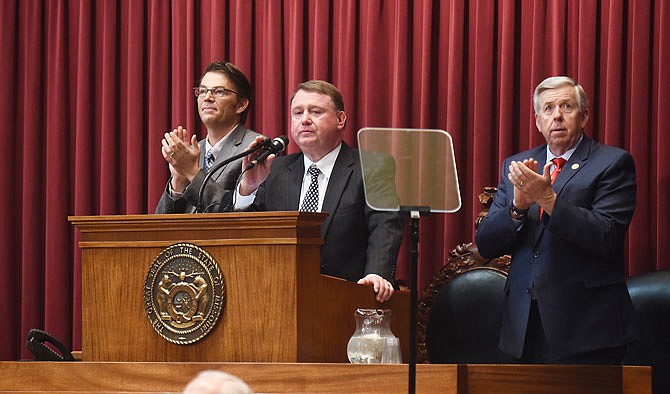Missouri's courts system is among the nation's best, Chief Justice Zel Fischer told a joint legislative session Wednesday morning.
But the state must do more - in the courts and in society - to focus on the opioid crisis, he said during his 25-minute State of the Judiciary address.
"Drug overdose is the leading cause of accidental death in the United States, with the rate of overdose deaths involving opioids continuing to climb," Fischer reminded lawmakers. "Missouri lost 1,066 people in 2015 and 1,371 people in 2016 to drug overdose. This is a staggering increase in deaths."
He noted the state already has successful treatment courts, where some people charged with drug- or alcohol-related crimes - most often first-time offenders - are given a chance to work through the issues and addictions rather than just be sentenced to prison.
"Missouri's treatment courts feature multi-disciplinary teams offering a two-fold solution," Fischer explained. "First, they are addressing the crimes that often are due to substance use. And second, they are helping those who are addicted, and their families, improve their lives and break the cycle of addiction.
"We have already seen the increase in the number of participants entering our treatment courts who say their drug of choice is heroin or other opioids."
He noted "the undisputed research demonstrates that treatment courts are more cost-effective than any other criminal justice strategy. But our treatment courts have been able to serve only a small percentage of those individuals facing felony drug charges."
Those numbers dropped even more last summer, Fischer noted, when the 2017-18 state budget year began July 1 with a "27-percent core reduction to existing programs. Since then, admissions into our various treatment court programs has dropped an average of 23 percent.
"And right now, there are 15 counties with no access to any type of treatment court."
The budget proposal Gov. Eric Greitens released Monday includes a funding increase for drug courts, restoring last year's cuts and adding about $1.75 million.
Fischer didn't comment on that directly, but encouraged lawmakers to help "expand the reach of treatment courts in hopes of making this resource-saving, life-saving program available in every Missouri jurisdiction."
State Rep. Travis Fitzwater, R-Holts Summit, agreed with the idea.
"The budget is tight," Fitzwater said, "(but) we should invest in things that reduce the back-end costs.
"So, if we can do more treatment and stop putting people in jail for drug crimes - as long as they're not hurting anybody in their communities - (then) we should do whatever we can to invest in that."
State Sen. Mike Kehoe, R-Jefferson City, said: "I think there's going to have to be a way to find that, because you heard the statistics - that when you can get in front of the problem, it ends up working out much better not only for the person involved in the problem but for our society, the cities (and) the community."
While Rep. Jay Barnes, R-Jefferson City, also agreed Missouri's courts "are making great strides in helping the fight against opioid addiction," he's not sure how easy it will be to get more money for them in a tight budget year.
Fischer noted near the beginning of his speech that, overall, "Missouri's judiciary is in good shape. We are nationally recognized as leaders.
He said that includes being the first state to adopt a uniform bar examination, which gives law school students a chance to use the same test results when seeking jobs in a number of different states.
Fischer noted Missouri also remains a leader in using technology.
"More than a decade ago, we became the first state to offer the public access to information from a statewide case management system using Case.net," he reminded lawmakers, "and last summer, Missouri was ranked third - not nationally but internationally - for the best use of technology to improve court services and access to the public."
Only Arizona and Dubai ranked higher, he reported.
State Rep. Mike Bernskoetter, R-Jefferson City, "thought (that) was fantastic," as well as Fischer's noting "the drug courts are really working."
Fischer said Missouri isn't following the national trend of decreasing violent crimes.
"As a result, we are spending more on corrections than ever before," he said. "Our total incarceration rate remains well above the national average and is growing."
He said a task force formed last year "is developing legislative options for you to consider (and) we are optimistic these changes will produce significant, sensible and meaningful improvements."
State Sen. Jeanie Riddle, R-Mokane, said: "Our judiciary looked at the areas where we can make improvement and has ideas on how we can work together to accomplish that.
"And, so, I'm very excited."

